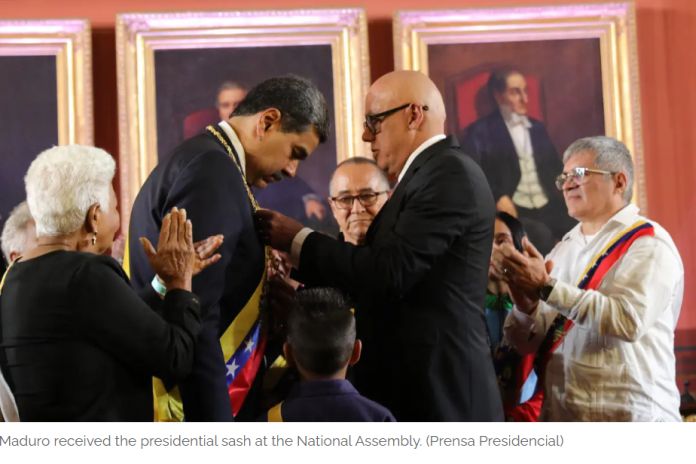- The Venezuelan president pledged that his upcoming six-year mandate would be one of “peace and prosperity.”
By Ricardo Vaz
CARACAS, (venezuelanalysis.com) – Nicolás Maduro has been formally sworn in for his third presidential term in Venezuela. The 62-year-old who heads the country’s United Socialist Party (PSUV) will serve in office until January 10, 2031, as dictated by the Venezuelan Constitution. The inauguration ceremony took place on Friday morning at the National Assembly’s legislative palace in Caracas. It featured representatives from all of Venezuela’s state powers, as well as international delegations from 125 countries.
“I have not been placed as president by the US government or by the pro-imperialist governments of the Latin American right,” Maduro said in his speech. “The power I represent belongs to the people.” The Venezuelan leader expressed “great emotion” upon receiving the presidential sash from National Assembly President Jorge Rodríguez and vowed “never to betray” the Venezuelan people. “This new presidential term will be a time of peace, prosperity, equality and a new democracy,” he added. “I swear on our history and on my life, we shall achieve it!”
Maduro pledged to advance the “seven transformations” campaign plan and announced plans to evaluate a constitutional reform later in the year. The build-up to the swearing-in ceremony has seen the PSUV, allied political organizations and grassroots collectives stage permanent mobilizations in Caracas and other cities. Government supporters held a massive demonstration without incident on Thursday in the opposition’s traditional strongholds in eastern Caracas, with a new rally in the historic area of Los Próceres set for Friday afternoon.
The Venezuelan capital is likewise hosting the International Anti-Fascist Festival which brings together hundreds of delegates from around the world to debate and strategize against rising global far-right threats.
Maduro was first elected in April 2013, shortly after the death of his predecessor and mentor Hugo Chávez, narrowly defeating opposition candidate Henrique Capriles. He won re-election in a landslide in May 2018, running at the time against Henri Falcón.
On July 28, 2024, Venezuela’s electoral authorities declared Maduro the winner of the presidential contest, awarding him a third term in office. The result was ratified in August by the country’s Supreme Court.
The Venezuelan US-backed opposition, led by far-right María Corina Machado, refused to accept the outcome and claimed that its candidate Edmundo González was the victor. González, a 75-year-old former diplomat, recently embarked on an international tour to garner support from Washington and allied Latin American governments.
Maduro’s tenure has seen the Venezuelan government face repeated regime-change operations headed by the hardline opposition. Efforts have included extended periods of insurrectionary street violence, a self-proclaimed parallel government, a military putsch and an attempted paramilitary invasion. The president himself was targeted by an assassination plot in August 2018.
In parallel, successive US administrations have sought to strangle the Venezuelan economy with unilateral sanctions. The US Treasury Department has particularly targeted the Caribbean nation’s oil sector. Venezuela’s economy suffered significantly, with GDP contracting by more than three-quarters before a modest recovery since 2021.
On Friday, the Treasury’s Office for Foreign Assets Control (OFAC) blacklisted eight Venezuelan officials for their alleged “support for Maduro’s repression and illegitimate claim to power.” The designated individuals include state oil company PDVSA president Héctor Obregón, transport minister Ramón Velásquez and head of CICPC forensic police Douglas Rico.
Washington had previously targeted 21 Venezuelan state and military officials with individual sanctions following the presidential election.
The European Union followed the US’ lead by renewing existing individual restrictions and extending them to a further 15 Venezuelan state officials. The UK and Canada also joined with fresh sanctions against Venezuelan officials.
The US Department of Homeland Security also announced at the same time an 18-month extension of “Temporary Protected Status” (TPS) for Venezuelans living in the United States. US president-elect Donald Trump will take office on January 20 and has pledged to engage in the largest deportation operation in US history. Trump has vowed to end the TPS program.
The presidential inauguration saw the outgoing Biden administration reiterate its support for the opposition’s victory claim, with secretary of state Antony Blinken writing on social media that Maduro “has no right to claim the presidency.”
The White House additionally raised existing rewards for “information leading to arrests and/or convictions” of Maduro and iterior minister Diosdado Cabello to US $25 million. It went on to introduce a $15 million bounty for defense minister Vladimir Padrino López.
The rewards stem from March 2020 indictments by the US Justice Department over alleged ties between Venezuelan high-ranking officials and “narcoterrorism.” However, US authorities have never provided evidence to support the charges, while US agency reports have shown most of the drug trade in the hemisphere to flow through Colombia and Central America.





